Plot Summary: Eliza Thornberry, a girl with the power to talk to animals, travels across Africa in order to thwart poachers, rescue a cheetah cub and save hundreds of elephants from destruction.
In this entry, I look at healthy family dynamics, sisterly love, interracial friendships/relationships, beauty standards and colonialism/White supremacy in the American animated comedy The Wild Thornberrys Movie. (The content under the cut contains spoilers.)
Eliza Thornberry (Lacey Chabert) is an adventurous twelve-year-old geek. She travels the world with her family; her parents, famed wildlife documentarians Nigel and Marianne Thornberry (Tim Curry and Jodi Carlisle), her constantly exasperated sixteen-year-old sister Debbie (Dannielle Harris), her adopted “wild child” brother Donnie (Flea of the Red Hot Chili Peppers) and her best friend Darwin (Tom Kane), an erudite chimpanzee. About two years prior to the opening of the movie (and the series it is based on, which has a floating timeline where the characters do not age across seasons), Eliza saved a warthog from a trap, unaware that the terrified creature was actually the shapeshifting Shaman Mnyambo. As a reward for her kindness, the shaman granted Eliza the ability to communicate with all animals. However, if she ever tells anyone about this ability, she will lose it.
The film begins with Eliza playing with three cheetah cubs out on the plain. She disobeys the instructions of their mother Akela (Alfre Woodard) not to venture beyond a certain point. Due to Eliza’s recklessness, the cubs are out in the open when poachers fly over in a helicopter, and one of the cubs, Tally, is abducted. Wracked with guilt, Eliza vows to rescue Tally, but her concerned British grandmother Cordelia (Lynn Redgrave) convinces Nigel and Marianne to send Eliza to boarding school in England out of concern for her safety. When Shaman Mnyambo appears to Eliza in a dream to tell her that Tally is still alive, Eliza travels from England back to Africa to chase down the poachers and set things right.
The Wild Thornberrys was one of my favourite animated series as a child. The series is exciting, funny, packed with colourful characters and teaches children about nature and the importance of wildlife conservation in a way that feels vital, not preachy. Taking into account Nickelodeon’s track record with theatrical versions of its TV cartoons, it was about a 50% chance that the film version would be successful, considering it followed The Rugrats Movie (a runaway success) and Hey Arnold: The Movie (a complete flop). Happily for all the fans, The Wild Thornberrys Movie was absolutely delightful.
To begin with, the animation from Klasky-Csupo is excellent. This is the production team behind Rugrats attempting to convey the scope and majesty of The Lion King, and arguably doing a very solid job. The soundtrack is also fantastic. My favourite track is Don’t Walk Away by Youssou N’Dour, but you can find the rest of the soundtrack here on YouTube. Of course, the film ends with a dance party with music from Brandy and Bow Wow, because nobody knew any other way to conclude a theatrical children’s film in the 2000s. In all seriousness, the soundtrack in eclectic and very charming, and is definitely worth a listen.
As in my last review of The Getting of Wisdom, this film has the advantage of featuring a lead girl character who is not conventionally pretty. While she is a skinny White girl, Eliza has red hair, glasses, “freckles and bad teeth” (Oldenburg 2002). This was largely due to the influence of series creator Gabor Csupo, who “raised the issue that not all young heroines need to be beautiful” (Casemiro in Beck 2007, 96). Despite the success of the series, Eliza’s looks continued to be controversial at Nickelodeon: according to series writer Kate Boutilier (in Beck 2007, 96), “Every ten episodes or so, a writer would come in and propose a show where Eliza gets her braces off … and the same went for Eliza getting contact lenses.” Thankfully, for much of the series the writers held out. Boutilier recalls taking pride in Eliza’s looks, particularly after her twelve-year-old niece saw the initial character design and exclaimed, “I love her! She has glasses and braces just like me!” (in Beck 2007, 96). In the truncated final season of the show, however, Eliza got a girlier hairstyle and spent most of the episodes angsting over whether the teen pop star who was staying with the Thornberrys liked her or Debbie better.
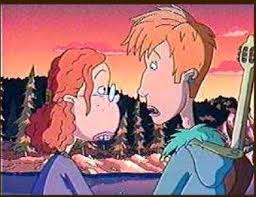
Happily, in the film version, audiences get to see the version of Eliza most familiar from the television series.
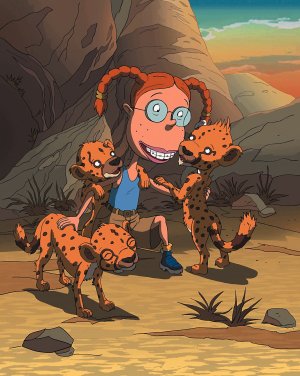
Rewatching the series and the film as an adult, what delighted me most was its portrayal of family. The Thornberrys are comic characters, but the parents are involved, reasonable and supportive. They adore their biological and adopted children, feel concern for their welfare and give them plenty of responsibility and freedom. They address the girls as intelligent people. An episode which sticks out for me is “Matadi or Bust,” in which Eliza learns that Kip and Biederman, two villainous poachers, are transporting a hippo illegally on the same river boat the Thornberrys are travelling on. She immediately runs to Nigel and asks him to intervene, and – to my utter delight – her father believes her and confronts Kip and Biederman. No condescending head-patting, no “You’re young and female, so how can I trust anything you say?” When Kip and Biederman produce a forged permit, Nigel congratulates them on turning over a new leaf, and it is from there that Eliza must work to save the hippo. We can see here that parents do not need to be inept and awful in order for an exciting plot to move forward. Media has the potential to model healthy family dynamics while still delivering a roller-coaster narrative.
Another thing that makes the series and the film a joy to rewatch is the relationship between Eliza and her sister Debbie. So many of the interactions between them remind me of my relationship with my older sister – both their bickering and their easy familiarity with each other, like in the episode “Dear Diary,” where they wash dishes together and imitate their family members.
In the film, Eliza is coded as a child, with a prepubescent body and no particular interest in romance or cultivating her image. Debbie is the quintessential teenager, always ready with a withering remark for her uncool family. The girls clash, and at first glance, viewers might be tempted to ascribe this to the Glorious War of Sisterly Rivalry that exists in media to let us all know that you can be plain, smart and adventurous, or pretty, dumb and wimpy, but never both, and that people with these qualities are obliged to hate each other.
Although the Klasky-Csupo animation style generally makes all its characters look odd and lumpy, it is clear that Debbie is quite a pretty girl, whereas Eliza is both prepubescent and awkward-looking. However, the thing I love is that Debbie and Eliza’s sisterly antipathy for one another doesn’t stem from Debbie being pretty and Eliza being plain, or even from the three or four years difference in age between them. Rather, their natural differences are exaggerated by the situation they have found themselves in, as the children of wildlife documentarians.
Eliza loves travelling the world. She finds other cultures endlessly fascinating and never lacks for company due to her ability to converse with animals. Debbie, on the other hand, suffers from loneliness and boredom and takes out her frustrations on her siblings and parents. She yearns for a “normal” adolescence, with access to popular culture and opportunities to pursue friendship and romance. For this reason, the sisters often clash, with Debbie teasing Eliza mercilessly for being a geek (read: feeling frustrated and jealous that Eliza is happy and fulfilled in the situation that Debbie hates so much).


When I was of an age to see this film in theatres, my siblings and I also found that our natural differences were exaggerated by the circumstances we found ourselves in. However, since I didn’t really have the language or the self-awareness to describe this, I put my unhealthy relationship dynamics with my sister down to the fact that I was “smart” (i.e. socially awkward with glasses) and my older sister was a “ditz” (i.e. had some interest in boys and had friends she could hang out with at the weekends).
Despite their differences, Eliza and Debbie are each depicted as incredibly tough, resourceful girls without particularly conceiving of themselves as such. For the Thornberry sisters, an animal stampede rushing through their camp is barely worth blinking an eye at – they simply climb on the picnic table and wait it out.
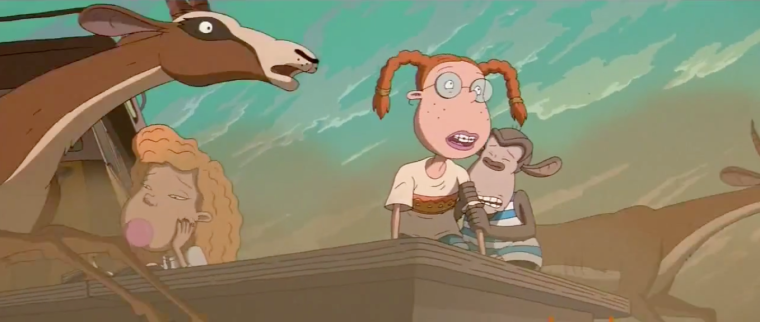
Another noteworthy thing about this film is its portrayal of an interracial/intercultural friendship (and attraction) between Debbie and an African boy named Boko. Boko is about four feet tall and speaks no English. Happily, he is not positioned as an unwanted admirer. When he helps pull Debbie and her motorcycle out of some mud in the jungle, she becomes flustered and primps her hair, telling him, “I don’t normally look this bad, just so you know.” When Debbie is pulled out of the mud and it becomes more apparent that she is much taller than Boko, there is no “waah waaaaah” music cue or embarrassed reaction shot to imply to the child audience that Boko no longer counts as a cute boy because he’s short.
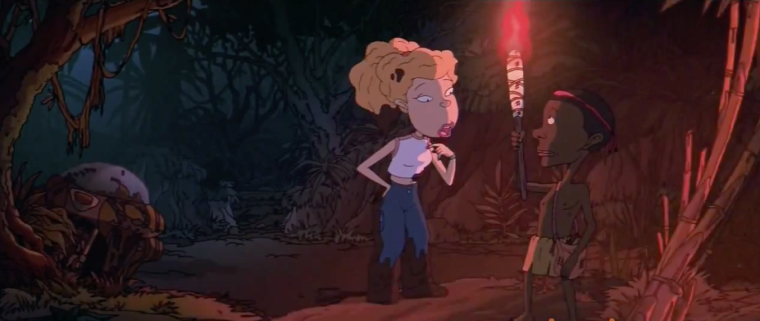
Boko and his family take Debbie home for the night. When Debbie wakes up the next morning, Boko gives her a clean skirt to wear and some breakfast. When Debbie realises that the food she’s eating comes from a termite mound, she looks nauseated (which I was less than thrilled with; we could do with a lot less “oh, foreigners and their weird gross food!” humour in media), but to the film’s credit, she doesn’t spit the food out, but swallows it and proclaims it “Delicious.”
As Debbie attempts to leave Boko’s village and resume her search for Eliza, she falls off her motorcycle several times due to a mixture of inexperience with driving and not paying attention to her surroundings. Boko’s elders in the village tell him to accompany her, fearing that she will be killed trying to travel through the jungle. Debbie tries to discourage Boko from coming: “Boko, listen, you can’t come with me, okay? It’s not that I don’t like you, because I do, and it’s not about the height thing, because it isn’t. I just can’t drag you into this family drama!” As Debbie talks, Boko prevents her from being attacked by a huge snake. Debbie gasps in shock and then, seeing that Boko will be able to help her, offers him the other motorcycle helmet, asking, “Think this’ll fit?”
Debbie and Boko pull up to the camp where the film’s villains are keeping Eliza, Darwin and Donnie captive. Seizing Debbie, one of the poachers tells Eliza that if she does not tell him how she learned about his plot, he will throw Debbie over a cliff. Eliza agonises, since all the secret information she has comes from the animals, and there is no time to devise a convincing lie. In the space of a second, Eliza is forced to choose between her powers and her sister – and she chooses Debbie. Afterwards, the sisters discuss the implications of Eliza’s choice:
Debbie: “I have a few things to say to that monkey! Tell him I don’t appreciate it when he leaves pizza crusts in the seat cushions. Go ahead, tell him!”
Eliza: “Debbie, I broke the rule. I told about my powers, so I lost them.”
Debbie: “Oh my gosh! You did that … for me?”
Eliza: “Now I can’t talk to Darwin any more, and the last thing I said to him was really mean. I can’t even tell him I’m sorry.”
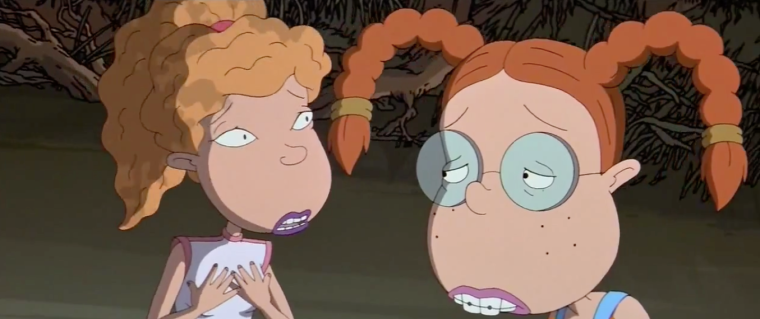
Later, when things seem hopeless and it looks like the poachers are going to exterminate hundreds of elephants using an electric fence, Debbie galvanises Eliza to action by using the knowledge only she has, as someone who has known Eliza all her life.
Eliza: “Shaman Mnyambo told me in a dream that he gave me my gift for a reason. It doesn’t matter now – I lost it.”
Debbie: “Okay, enough with the ‘poor me, I lost my magic powers’ bit. Are you just going to sit there?”
Eliza: “What am I supposed to do? I’m just an ordinary girl now.”
Debbie: “You? Eliza, ever since you were a little kid you dragged home birds with broken wings and creepy toads and stuff. You didn’t have special powers then, you just cared. Trust me, you were never ordinary.”
(Quick pause for me to hug myself in delight here, since this is one of my absolute favourite tropes – a character being stripped of everything that gave them an advantage, that made them special and powerful, and finding the inner strength to come out on top.)
While I love The Wild Thornberrys Movie and the TV series, and will cheerfully press it on any and every child I love, it’s important to acknowledge that it falls smack bang into a tradition of storytelling where White people are the ones who have mastery of supposedly “wild, untamed” areas of the world where non-White people have been living for millions of years. To Nickelodeon’s credit, efforts were made to portray the wildlife and indigenous cultures of the places the Thornberrys visited as accurately as possible, and the Thornberrys often work with local people (such as Nigel’s longtime best friend Jomo) to aid conservation efforts.
That said, it must be highlighted that Shaman Mnyambo gives the “gift of the gab” to a White child, in much the same way that so many popular cultural texts depict indigenous or non-White people passing along their secrets, their power and their culture to White children rather than their own young people. Whether it’s magical powers or musical traditions or anything in between, Western popular culture is far more likely to show a White child as the one who is most worthy to carry these things into the future.
In regards to Tippi Degré, the White daughter of French wildlife photographers who is sometimes referred to as a “real life Eliza Thornberry” because of her childhood in the Namibian bush, Tumblr user atane points out that “Being white doesn’t make her story any more special than that of … countless black tribal Africans.” The same can be said of Eliza: why should a White, North American child automatically be the receiver of such an extraordinary gift? Why not a girl or boy from Mnyambo’s own people, or any other African country? Arguments would doubtless be made that a White, North American child protagonist is more relatable to the series/film’s target audience than a foreign child of colour – but the idea that White people are the default and are automatically more interesting, sympathetic and indeed relatable than people of any other race propagates White supremacy, so we shouldn’t excuse it.
However, if you can look past the unfortunate implications, whether or not you’ve seen the series it’s based on, The Wild Thornberrys Movie is a fantastic adventure story, with superb animation, excellent voice acting and a magnificent lesson about love, family and perseverance in the face of seemingly unbeatable odds.
Trailer
Reference
- Beck, Jerry. 2007. Not Just Cartoons: Nicktoons! New York: Melcher Media.
- Oldenburg, Ann. 2002. “Eliza Talks to the Animals.” USA Today. Available at http://usatoday30.usatoday.com/life/movies/news/2002-12-19-eliza-thornberrys_x.htm

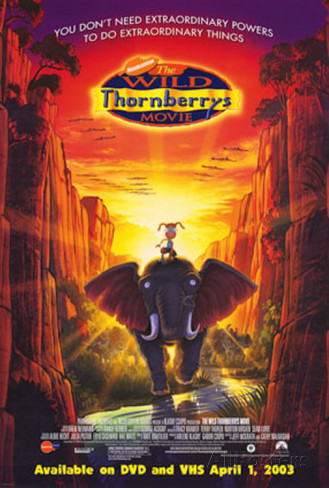
It was an enjoyable article, but it’s kind of all over the place. The title says it’s a movie review and it seems you try to steer to their, but you get caught up in your joy of the series as a whole.
Also, I don’t quite see the Thornberry’s as a healthy family. Yes, they let Eliza be herself without question and expect their children to understand what they’re saying; but they don’t respect Debby’s needs. In their promise to keep “the family together” the consistently ignore her needs and are quite authoritarian towards her, a sharp contrast to Eliza.
When they finally question Eliza in the movie to “send her to safety” (punishing her for what they’ve been allowing her to do without question) they get upset about breaking the family apart while ignoring Debby’s desperate pleas to have her own happy life. Does that sound healthy to you?
LikeLike
Thank you for your comment! I love your point about the double standards extended to Debbie and Eliza. I think that writing choice could be down to late 1990s-early 2000s Nickelodeon’s brand identity as a children’s network. I’ve noticed that the series often portrays Debbie’s life as a teenager as categorically inferior to Eliza’s exciting life as a twelve-year-old who is coded very much as a child. Debbie often stays behind at camp to babysit Donnie and work on various small-scale projects (like entering a magazine contest or petitioning her parents to gift her a trailer so she can have her own room), whereas Eliza explores and has adventures. I think there could be a wish-fulfilment aspect in this. Many children who watched The Wild Thornberrys would have been of an age to see their teenage siblings as annoying and bossy, rather than viewing adolescence as aspirational. Showing the child sibling having her perspective valued and the teenage sibling being treated as a nuisance could have been part of the network’s efforts to woo a child audience for the series – a dynamic which then carried over into the film.
Like the other entries on this blog, this entry wasn’t intended to provide a cohesive review of the film. Rather, the objective of the blog is to write about aspects of films that I enjoy or consider noteworthy, from a girlhood representation perspective. It’s more of a space to play around with new ideas that I can use further down the track than a portfolio of fully-formed writing. But if I return to writing about The Wild Thornberrys later on, your comment has helped me round out my perspective.
LikeLike